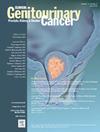Expert Opinion on Current Treatment Alternatives for Patients With Prostate Cancer Progressing From the Metastatic Hormone-Sensitive Stage to the Castration-Resistant Stage After Receiving Early Treatment Intensification
IF 2.7
3区 医学
Q3 ONCOLOGY
引用次数: 0
Abstract
For patients with castration-sensitive prostate cancer (mCSPC), treatment intensification with androgen deprivation therapy (ADT) plus new androgen receptor pathway inhibitors (ARPIs) has opened a scenario where no guidance exists to indicate the best treatment after progression to metastatic castration-resistant prostate cancer (mCRPC). Clinical decision-making has become even more complex, with the proven benefit for selected patients of triplet therapy with abiraterone or darolutamide added to the double combination therapy of ADT plus docetaxel. The profile of patients for whom triple therapy would be more beneficial is being defined beyond metastatic disease presentation and volume (eg, poor prognosis features). In October 2023 and October 2024, a panel of eight Spanish medical oncologists with expertise in the management of prostate cancer met to discuss the challenges in treating mCRPC. The scientific evidence was reviewed during this meeting, knowledge and experience were shared, and controversies were discussed until a consensus was reached. This information was collected and turned into a manuscript aimed at helping clinicians determine the optimal treatment sequence after disease progression based on scientific evidence and experts’ opinions and consensus. To this end, the profile of mCSPC patients who may have received double or triplet therapy is analyzed, current treatment options are reviewed, and treatment algorithms are proposed. New and expected advancements in this field are also presented.
早期强化治疗后从转移性激素敏感期进展到去势抵抗期的前列腺癌患者的现有治疗方案的专家意见
对于去势敏感性前列腺癌(mCSPC)患者,雄激素剥夺疗法(ADT)加新的雄激素受体途径抑制剂(arpi)的强化治疗已经开启了一个场景,没有指南表明转移性去势抵抗性前列腺癌(mCRPC)进展后的最佳治疗。临床决策变得更加复杂,在ADT +多西紫杉醇的双重联合治疗中加入阿比特龙或达洛鲁胺三联治疗已被证实对选定的患者有益。除了转移性疾病的表现和数量(例如,预后差的特征)之外,三联疗法更有益的患者的概况正在被定义。在2023年10月和2024年10月,一个由8位具有前列腺癌管理专业知识的西班牙医学肿瘤学家组成的小组开会讨论了治疗mCRPC的挑战。会议审查了科学证据,分享了知识和经验,讨论了争议,直到达成共识。收集这些信息并将其转化为手稿,旨在帮助临床医生根据科学证据和专家意见和共识确定疾病进展后的最佳治疗顺序。为此,我们分析了可能接受过双重或三重治疗的mCSPC患者的概况,回顾了目前的治疗方案,并提出了治疗算法。本文还介绍了该领域的新进展和预期进展。
本文章由计算机程序翻译,如有差异,请以英文原文为准。
求助全文
约1分钟内获得全文
求助全文
来源期刊

Clinical genitourinary cancer
医学-泌尿学与肾脏学
CiteScore
5.20
自引率
6.20%
发文量
201
审稿时长
54 days
期刊介绍:
Clinical Genitourinary Cancer is a peer-reviewed journal that publishes original articles describing various aspects of clinical and translational research in genitourinary cancers. Clinical Genitourinary Cancer is devoted to articles on detection, diagnosis, prevention, and treatment of genitourinary cancers. The main emphasis is on recent scientific developments in all areas related to genitourinary malignancies. Specific areas of interest include clinical research and mechanistic approaches; drug sensitivity and resistance; gene and antisense therapy; pathology, markers, and prognostic indicators; chemoprevention strategies; multimodality therapy; and integration of various approaches.
 求助内容:
求助内容: 应助结果提醒方式:
应助结果提醒方式:


